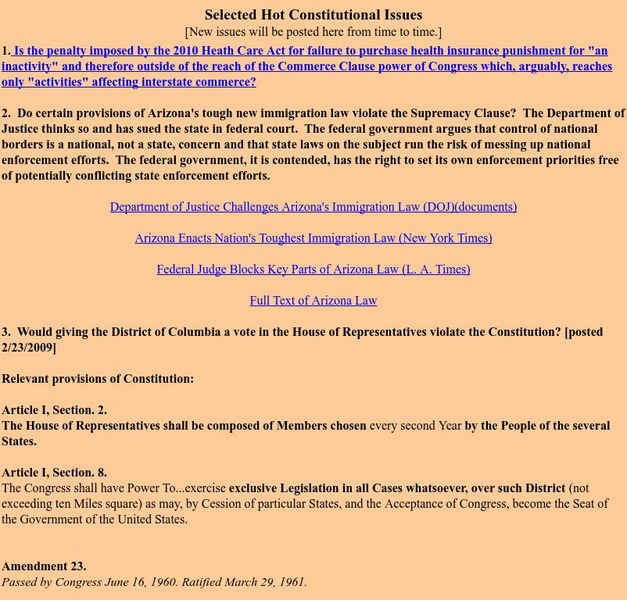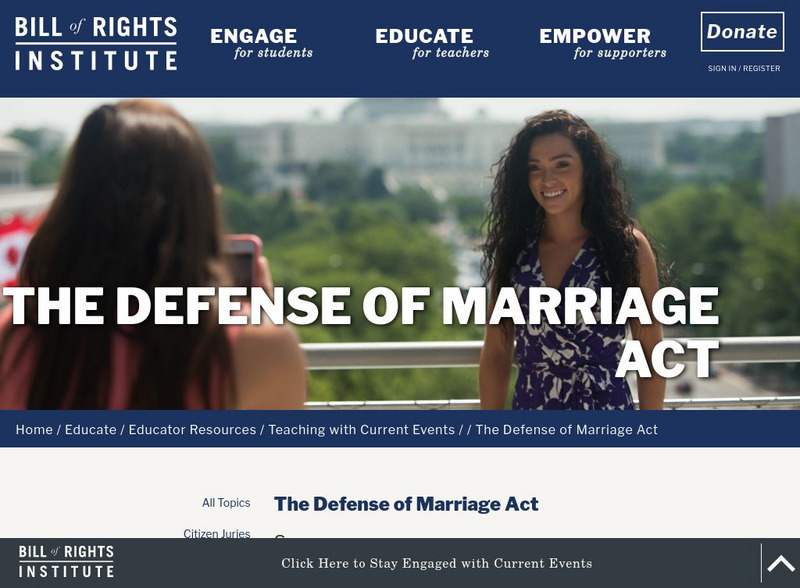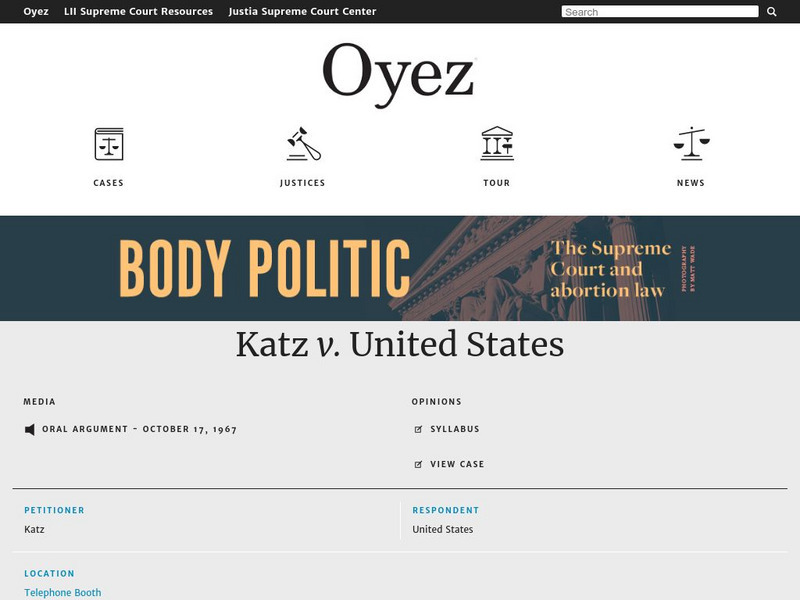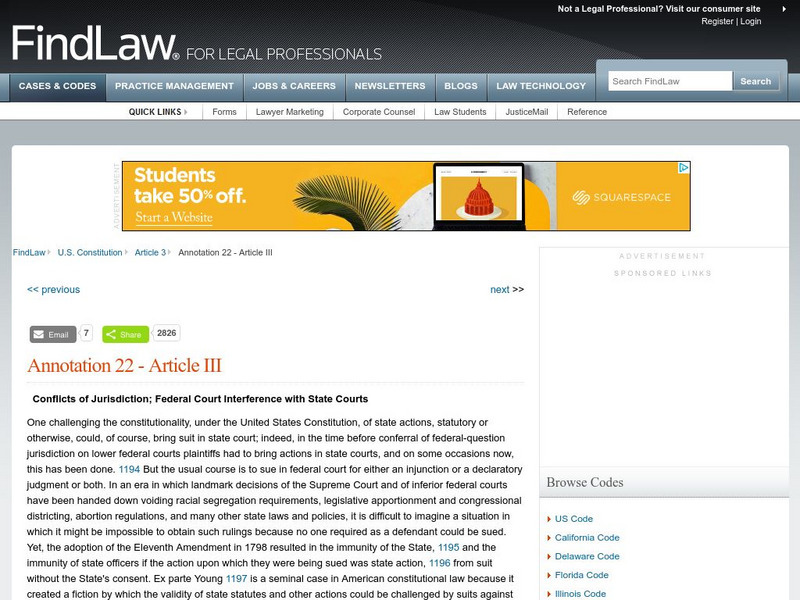Hi, what do you want to do?
Administrative Office of the US Courts
Nomination Process
"I do solemnly swear that I will support and defend the Constitution of the United States..." Scholars investigate the nomination process of Supreme Court justices when assuming office. Through examination of primary and secondary...
National Endowment for the Humanities
James Madison: Raising an Army—Balancing the States and the Federal Government
To war! To war! Every nation in the history of the world has had to deal with warfare on some level. Scholars go through a series of activities and discussions surrounding the development of the Constitution to help them better...
National Endowment for the Humanities
Lesson 2 James Madison: The Second National Bank—Powers Not Specified in the Constitution
How much power is too much power for the federal government? Scholars use primary documents and constitutional research in groups to analyze the creation of the Second National Bank under James Madison. This is the second lesson of a...
National Endowment for the Humanities
Lesson 4 James Madison: Internal Improvements Balancing Act—Federal/State and Executive/Legislative
Who has the power? The founding fathers asked the same question when the United States was formed. Learners explore issues that arose during Madison’s presidency that raised constitutional questions. Through discovery, discussion, and...
National Constitution Center
Interactive Constitution
Did you know there are seven Articles and 27 Amendments to the US Constitution? Explore each and every one of them, including the Bill of Rights and other rights around the world, in a super neat US Constitution interactive.
Youth Outreach
Connecting the Separate Powers
Scholars demonstrate what they know about the separation of powers through role play. Two individuals act out a skit as the remaining class members discuss and decide whether the interaction they observed is an appropriate example...
Curated OER
Constitutional Convention Simulation
Why did the Founders make it so challenging to amend the US Constitution? To gain an understanding of why the process is so difficult, class members engage in a Constitutional Convention simulation. Groups draft, propose, and debate...
School Improvement in Maryland
Court Proceedings Civil Cases
What's the difference between civil and criminal law? How do the court proceedings differ in these two types of trials? How do the standards of proof differ? Why do these differences exist? As part of their examination of the...
Curated OER
Case Study: Constitutional Law
Posed here is an issue of land ownership and law from the year 1773. Learners can use what they know about the US Constitution, statehood, and Articles I, III, and IV to answer five questions regarding the scenario.
Curated OER
Running for Freedom: The FUgitive Slave law and the Coming of the Civil War
In order to understand the complicated nature of slave laws during the Civil War, learners compare and contrast an abolitionist poster and a runaway slave ad. They use an attached worksheet to consider each primary source document, then...
Cornell College
Dred Scott v. Sandford Supreme Court Decision
Dred Scott was a harbinger of the Civil War. An enslaved man claimed freedom because his owner had taken him into free territory. Not only did the Supreme Court rule that Dred Scott and his wife were to remain enslaved, but it also ruled...
Center for Civic Education
Matching Game with the US Constitution
In September we celebrate Constitution Day. Begin the celebration with a grand conversation about the US Constitution. Follow up the in-depth discussion with a learning game in which scholars match terms to images such as...
Curated OER
Arrest
Students become active participants in the legal process as they take on the roles of witnesses, jurors, and defendants in a trial simulation. An understanding and appreciation of the legal system is fostered through the experience.
Curated OER
How is Our Government Organized?
Students explore rights of their clients. In this constitutional law lesson, students play an online game that requires them to review individual cases in order to determine the rights their clients have.
University of Missouri
Exploring Constitutional Conflicts: Select Hot Constitutional Issues
Among other issues considered, Hot Constitutional Issues probes into the constitutionality of giving Washington, D.C. a vote in the House of Representatives, raised in 2009.
Bill of Rights Institute
Bill of Rights Institute: The Defense of Marriage Act
A lesson plan addressing what happens when Congress passes a law or an act, but the law is unconstitutional.
Illinois Institute of Technology
The Oyez Project: Katz v. United States
Katz v. United States altered the meaning of the 4th Amendment, the right to search and seizure, appealing his case in 1967 regarding the investigator's use of electronic surveillance. Oyez features the facts and recordings from the...
CPALMS
Florida State University Cpalms: Florida Students: What's Law Got to Do With It?
This tutorial explains the types of laws in the legal system of the United States. A PDF file of the tutorial is available.
Thomson Reuters
Find Law: Jurisdiction of Federal Courts
This site describes the jurisdiction of the Federal Court system. The site breaks the court's jurisdiction into three main areas of institutional conflict: Federal Restraint of State Courts by Injunctions, Habeas Corpus: Scope of the...
University of California
Ucla: Freedom of Speech vs. Workplace Harassment Law
This site contains excerpts from public law review articles relating to the issues of freedom of speech and workplace harassment.
Other
Human and Constitutional Rights: Comparative Constitutional Rights Chart
This Comparative Constitutional Rights Chart is very interesting to check out. The rights are broken into categories, and most of the information is accessed through links, along with additional information.
Other
American Law 101: Sources of American Law
This website provides a nice overview of the five common sources of American law (common law, statutory law, administrative law, court rules, and constitutional law.
Other
Touro Law Center: William Marbury vs. James Madison
Transcript of the landmark court case that established the constitutional principle of judicial review. Judicial review is the concept that the federal judiciary has final power as to whether an act of the Congress or the Executive...
Cornell University
Cornell University: Law School: Constitutional Law Overview
This site from the Cornell University Law School provides an overview of constitutional law as it applies in the United States, with links to additional information.




























